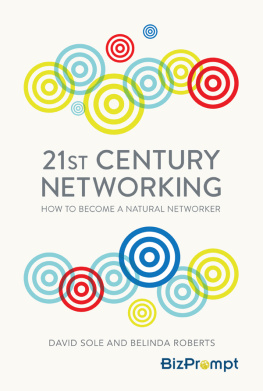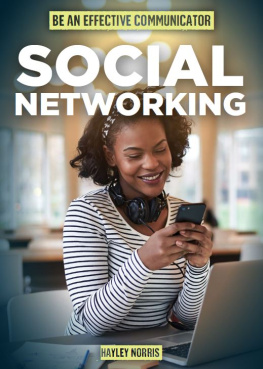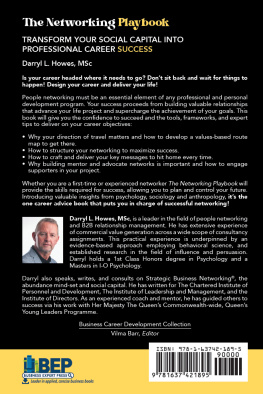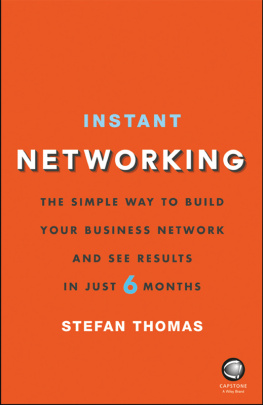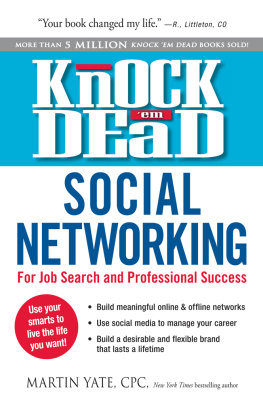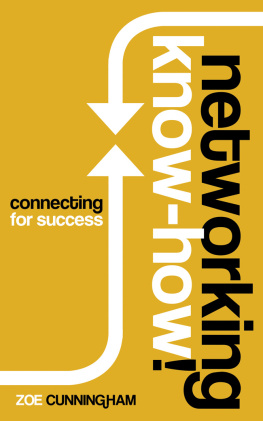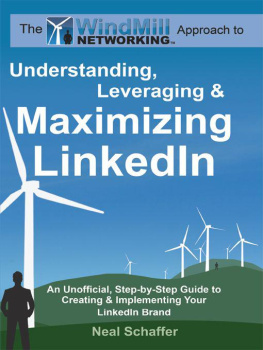

Contents
Introduction
Everyone has networks. Whether they are the group of friends that you socialise with, the colleagues that you work with, the people at the sports club that you spend your time with at weekends or the parents of your childrens friends, we all have networks. We have been forming them from an early age the friends we make at school, at university or college and then as we begin our working lives. We rely on relationships for support and help, to enable us to get things done and because, fundamentally, we like being part of a group indeed, we have a need to be part of a pack, to be in the gang or to belong. It is a basic emotional need.
And so we cultivate our networks we identify people that we get on with, that we relate to, that we have something in common with and our networks grow and develop. Yet for the most part, we do it intuitively and without thinking about it. When our partners suggest that we have friends round to dinner, we think about the mix of people that we are going to invite. From our list of friends, we consider who will get on with whom, whether the conversation around the dinner table will be enjoyable, humorous and stimulating, perhaps even connecting possible future partners on a blind date, and then we try to put together a guest list that meets those needs. We are networking.
When we talk about networking in business, however, most people either admit that theyre reluctant to engage with it, or they see it as an optional extra another task that has to fit into an already crammed diary. And because it is thought to be additional, it is ignored, because, of course, we can all think of something more important that we have to do. Even when people try to connect with us, if we cannot see the immediate value in making a new connection, it is often the first thing to be dropped from the diary. However, unless we invest time in networking, we are limiting our ability to achieve our full potential and the potential to grow and develop our businesses. The sad reality is that most people fail to appreciate the power of a strong network they dont realise that they need a network until they need it and by that time, it may feel like its too late. The good news is, its never too late to start networking.
Modern organisations increasingly rely on matrix-based structures where relationships have to be developed outside of your immediate colleagues and supervisors, and where influence is the way to get things done because you dont have any direct control. Those who do not invest time in developing a strong network are likely to fail, and those who do it well usually succeed.
Theres nothing new about networking. In his book The Tipping Point, Malcolm Gladwell tells the story of Paul Reveres midnight ride on 18 April 1775 to mobilise the militia as the English forces advanced on Lexington. Reveres social network was so well developed that those within it also took to their horses and, before long, a significant number of militia had been alerted. It was a classic case of Revere making his network really work for him. Revere wasnt the only rider sent out to raise the alarm a second person, by the name of William Dawes, also set off, heading south, while Revere went north. Dawes was able to alert a few people, but he did not have the same well-cultivated social network as Revere had, so Dawes failed by comparison. Revere was a social network broker.
In our modern, fast-paced world, people now often change job more frequently than in the past, and when you decide it is time to move onto a new role or challenge, life can prove to be very tough indeed unless you have a well-developed network. Around two thirds of people find their next job through their network, rather than through other channels. So you need a good network of people who know you and your capabilities and, when making your next move, you should focus your time on talking to them, rather than simply sending your CV to recruitment agencies; or update your profile on social media saying looking for a new opportunity technology and the internet offer many ways of connecting people, so its important to take advantage of them.
Good networking isnt a random activity. It isnt about accumulating business cards or having hundreds or even thousands of connections on LinkedIn. Networking is for everyone; its important in your current role as well as for your career development. Why wouldnt you want to do it, and do it well? There is no downside to effective networking.
Nonetheless, you need to have a plan. Decide what you want to achieve next. Then you need to understand how you are going to make the right connections to reach that objective, and from there you have to put your plan into practice. You also need to know the unwritten rules of networking the informal dos and donts and the social graces that go alongside them. As with many things in life, do it badly and it can be incredibly damaging, but do it well and its wonderfully rewarding. As with any investment, whether of time or money, the payback isnt always immediate, nor sometimes obvious but, rest assured, investing your time in networking does pay off.
So the purpose of this book is threefold:
We will help you build networks that are powerful and relevant.
We will teach you the skills of accomplished networking, help you understand how best to build great relationships with differing personalities, and how to keep those relationships alive and flourishing.
Finally, we will encourage you to make networking part of your daily routine so that, instead of seeing it as a chore, it just becomes part of your daily life, to the point where you dont even have to think about it.
We hope to help you develop yourself professionally and personally. We will endeavour to support you and your networks; our aim is for networking to become part of your daily life. It may be already you just dont know it. Good luck!
Networking: Whats the Point?
KEY POINTS
Be clear about the purpose of developing your network.
Be specific about who you are targeting and their relevance to you.
Divide your network into three sections: Personal, Internal and External.
In the modern world, where time is at a premium as never before, who wants to spare a thought for anything that doesnt deliver an immediate return or tangible result? Why would you give up time that could be spent with your family, friends, on a hobby or on meeting a work deadline to socialise with someone you dont know that well, might not have met before or who perhaps has nothing to do with your business? Its a waste of time. Isnt it? But networking is a fundamental part of our lives, even if were unaware of it; it is something we do on a daily basis, in almost every meaningful interaction we have.
As humans, we have some fundamental emotional needs, which have evolved over millions of years:
The need to belong
The need to be safe
The need to be valued
The need to feel in control
Our networks play to all of these needs we choose to spend time with the people we relate to the most: we like to feel supported by our mates and colleagues, we enjoy the sense of belonging to a tribe, such as the organisation where we work, and we take pleasure from being appreciated. Without this reassurance we feel insecure and anxious, and our self-confidence suffers.
Next page
